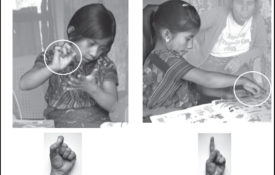-

New Content From Perspectives on Psychological Science
A sample of articles on climate change and substance-use behaviors, using reality checks to assess heterogeneity, using an ethics and social-justice approach to collecting and using demographic data, and much more.
-

The Self-Taught Vocabulary of Homesigning Deaf Children Supports Universal Constraints on Language
Researchers compared how young homesigners—deaf children without access to an established sign language—and English-, Spanish-, and Chinese-speaking adults describe the use of tools such as paintbrushes and knives.
-
The Puzzling Gap Between How Old You Are and How Old You Think You Are
This past thanksgiving, I asked my mother how old she was in her head. She didn’t pause, didn’t look up, didn’t even ask me to repeat the question, which would have been natural, given that it was both syntactically awkward and a little odd. We were in my brother’s dining room, setting the table. My mother folded another napkin. “Forty-five,” she said. She is 76. Why do so many people have an immediate, intuitive grasp of this highly abstract concept—“subjective age,” it’s called—when randomly presented with it? It’s bizarre, if you think about it. Certainly most of us don’t believe ourselves to be shorter or taller than we actually are.
-
Why Music Causes Memories to Flood Back
When Laura Nye Falsone’s first child was born in 1996, the Wallflowers album “Bringing Down the Horse” was a big hit. “All I have to hear are the first notes from ‘One Headlight,’ and I am back to dancing … with my brand-new baby boy in my arms,” she says. “It fills my heart with joy every time” When Carol Howard’s early-onset Alzheimer’s worsened, often she couldn’t recognize her husband. She once introduced him as her father. But if she heard a 1960s Simon & Garfunkel song playing, Howard, a marine biologist who died in 2019, could sing every word “effortlessly,” her husband says. This ability of music to conjure up vivid memories is a phenomenon well known to brain researchers.
-
Battle of the Brains: Pigeon vs. AI Learning? It’s Pretty Similar
The champions of unclouded thought were recently put to the test in a study that sought to explore if an illogical puzzle could be more easily solved by an animal with the associative learning approach of a computer. It saw researchers put a group of pigeons to the test to investigate their performance in a series of categorization tests compared to that of artificial intelligence (AI). Once those bird brains got going, it became apparent that their “brute force” approach to learning meant that actually, they were pretty closely matched to their coded competitors. Pigeons are creatures fuelled by simple motivations such as survival, reproduction, and the pursuit of seed.
-
She Taught Yale’s Most Popular Class Ever on Happiness. Then She Burned Out
Burnout isn't just for cubicle warriors and workaholic entrepreneurs. Nobel prize-winning geniuses and beloved celebrities burn out too. And so do experts on happiness, apparently. Yale psychologist Laurie Santos is famous for teaching the university's most popular class ever -- on happiness. Her insights on how to achieve the good life were so incredibly popular that they have even been turned into an online class taken by millions of people. If anyone should know how to maintain their psychological balance, it's Santos. But as she revealed to Time recently, the relentless stress of the pandemic even managed to burn her out.

